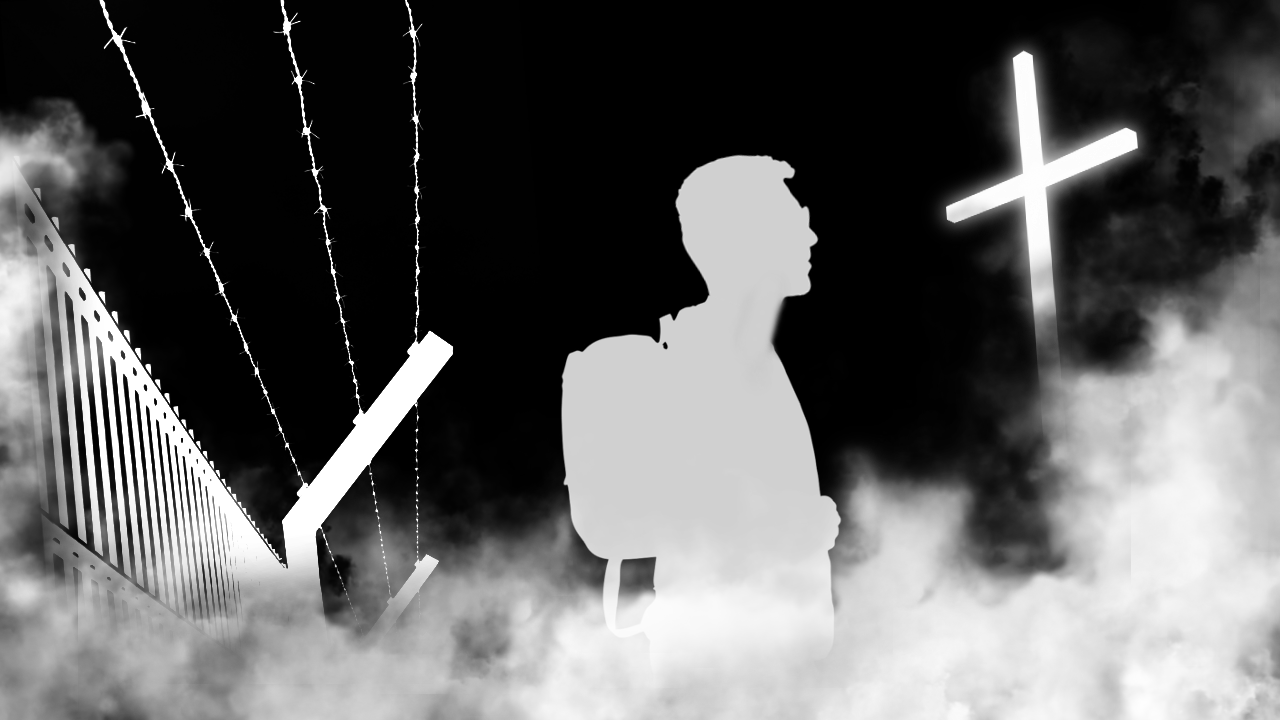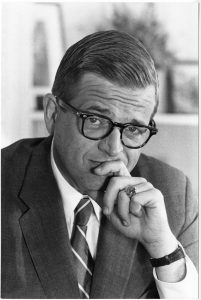
Imprisoned for Freedom—the Story of Charles Colson
Marshall Tankersley, Student Editor
Since the time of Job, believers have asked the question, ‘What is God doing in my life?’ The hand of God moves in mysterious ways, and God (rightly so) often does not reveal His plans to those He works on. This can be quite frustrating for us, yet believers are called to have faith in a reliable and always good God: a God who always has a right and true plan. Such was the situation that Charles Colson, author of the autobiography Born Again, found himself in.
Formerly a ‘hatchet man’ for President Richard Nixon, this lost soul was both found by and drawn towards God, and this event changed his life entirely. As a newly-converted Christian, Colson suddenly found bridges extended to him where chasms had formerly existed. Furthermore, Colson became animated by a new drive to pursue healing amidst an atmosphere of divisiveness that characterized the Watergate-traumatized Washington.
In salvation, Christ acts to both save and renew those who are now called His, cleansing His children from their sins and renewing them to be more like Him. Born Again is a fantastic and intensely personal example of these dual purposes enacted in Colson’s own life. Taking his audience on a journey from his immoral, pride-soaked career to his conversion and faith in Christ, Colson shows how his newfound identity in Christ both helps and hinders his personal life. Most of all, Colson shows how Christ acts preeminently in all things for His glory.
To begin with, one must understand the background of Colson’s story, which is all wrapped up in one word: Watergate, which is perhaps the greatest political scandal in American history.
In an attempt to gain information on the Democratic opponents of President Richard Nixon, a group of men broke into the DNC headquarters at the Watergate Hotel. Understandably, the idea that the American political system (especially the office of the President) could stoop to petty crime or a criminal cover-up sent shockwaves through society, breaking the trust of the American people for their leaders.
In the ensuing brouhaha, the Watergate scandal brought low the administration of Richard Nixon and the careers of others who were caught in its wake. One of those ensnared in the scandal was Nixon’s friend and compatriot, Charles Colson. Though Colson had nothing to do with the Watergate incident himself, he describes how he was swept along and eventually plead guilty to a lesser crime that he might not have committed. Still, in many ways, Colson discovered that God was working in and through him for reasons Colson did not understand, yet he learned to trust them as true.
After his conversion, Colson discovers that people treat him differently than they had done before. Colson’s sudden change in demeanor made him seem better to some, and ignominious and cast-down to others. Many of the actions Colson took (such as apologizing to Arthur Burns, who was Nixon’s Federal Reserve Chairman, for a story Colson had leaked under orders from Nixon) were at odds with the ethics he had previously espoused, and not many people were certain how to take that. Colson’s old political friends and foes thought they knew him, but they found him to be an entirely different man.
But there were new friends, especially fellow believers, with whom Colson found friendship and (most importantly) kinship. These men began to meet together to pray and build each other up in Christ in the midst of the chaos of Washington, and they began to see radical changes take place.
God’s Spirit was working in powerful ways all over strife-torn Washington. Each Monday morning when we met – Al, Graham, Doug, Harold, and I – someone would report another miracle, old adversaries coming together as brothers, new fellowships begun, prayer groups revived, unlikely men seeking a relationship with Christ. (Colson 203)
Ultimately, the cause of these changes (as well as the building of bridges between Colson and others) is down to Christ. Christ opened doors for Colson to walk through and do His will, both in giving him opportunities to proclaim Him on national television and in fellowshipping with fellow believers.
Colson’s emphasis on healing between people is contrasted against the divisive atmosphere choking out Washington. While the newly-converted Colson is seeking to make reparation for the wrongs he has wrought and to seek Christ in all things, other friendships and political affiliations are being torn asunder by the Watergate investigations. While Colson finds kinship with fellow believers, the news media (by and large) takes that as either a sign of his weakness or as if he was using it as a tactic to try and gain more mercy in the judicial process. Not many reporters stop and truly think about whether what Colson was saying was real or not; they are so swept up in the political divisiveness and the spiritual divisiveness that they don’t care.
Ultimately, Colson shows us that the root cause of such divisiveness is spiritual. Until one has been saved by the grace of God for the glory of God, one lives in spiritual death and cannot see or comprehend the truth. The glory and greatness of the cross is seen to be stupid, foolish, and wrong to those whom eyes and hearts Christ has not enlightened. Although Watergate proved to be an effective backdrop and excuse for the ridicule Colson received, it in and of itself does not tell the whole story. The ultimate war was not political; rather, it was spiritual. Still, Colson’s response to the furor (specifically after Dan Rather asked him point-bank about it) was profoundly Christian:
The decision was made. If Rather’s question was the result of a one-in-a-thousand coincidence, so be it. But if it was God’s doing, I must do my part. So I called the reporters back and did my best to explain my commitment. Even as I listened to the words coming out of my mouth against the clattering of typewriter keys on the other end of the phone it sounded unreal… (Colson 182)
Colson didn’t ultimately hide away from proclaiming his new allegiance to Christ. Instead, he made an effort to make it known in pubic, and known as it truly was, not as the reporters might take it and twist it. So should the Church act, not fearing man so much that they hide their beliefs, but boldly and wisely proclaim it for the glory of God.
Colson’s experience in Washington was not the only place or time when his faith was grown and put to the test. When he was convicted for having a part in the Watergate scandal (something Colson maintains his innocence about to this day), Colson was forced to rely on God more and more to survive a prison experience he was deathly afraid of. His time in prison also helped to grow his faith, as he dealt with threats on his life and threats on the lives of others. Colson’s Christian compassion was tested, as he learned to spread the Gospel to those prisoners who needed it the most, both in action and in words. Helping those who needed help (such as helping to transfer a prisoner with a mental health issue to an institution were he could be cared for) and praying for those who needed healing (such as the old moonshiner dying of a fever), Colson continued to grow in faith and maturity in Christ.
Charles Colson’s experiences stand in stark contrast not only to his own day, but also to modern times. Just as he faced opposition, so too does the Church today. The answer, though, remains the same: Christ forever. Christ, using His church as He will to the means He wills. Christ, growing His Church, never allowing any trial to be for vain but for the sanctification of His Church. Christ, guiding the church to what is ultimately best for her and giving her the means to endure. Christians in modern society should learn from Colson what it means to truly give oneself to that Christ, and to truly trust in Him beyond what one can see or understand. Even as Colson saw his future as hazy and unpredictable, still he knew that Christ would be by his side. Through the storms and trials of Watergate and prison, Colson never abandoned his faith. Colson exemplifies what all modern Christians should be: those who trust Christ for all of their lives, not just those mere episodes where things seem beyond their control.
Christians today can learn much from Born Again and the life of Charles Colson. It is a call to follow Christ with abandon, to count up the cost of what it means to follow the King of Kings and to do so with a glad heart. It is not a book that claims to solve all of the problems in the life of the Christian, but it shows something infinitely better: Christ is with us and for us no matter what, for He has paid our debt and covered us with His righteousness.
Colson paid for his sin on this earth, yet he could count himself free and redeemed in the most ultimate sense through Christ. Modern Christianity can do with a return to the basic, glorious proclamation of the Gospel that Colson shows through his own life, and a fleeing away from doctrine that promises only material wealth, health, social atonement, and so forth. Following Christ is hard, even if we do not have to go to prison for our crimes, but it is a road well worth the traveling for Christ Himself walks with the Christian and promises to be his reward at the end.
In the end, Colson came to Christ with nothing of his own, but just as he was. Similar to Colson, we all come to God in our sin, nakedness, and shame. But Christ sees our sin and pays for it with His blood. Christ loves us in the most true way, accepting us where we are. Colson discovered the truth of that on his journey from an existence of sin and shame to a life of forgiveness and glory. Perhaps it is best put by the old hymn “Just as I Am”:
Just as I am, poor, wretched, blind;
Sight, riches, healing of the mind,
Yea, all I need in Thee to find,
O Lamb of God, I come, I come.Just as I am, Thou wilt receive,
Wilt welcome, pardon, cleanse, relieve;
Because Thy promise I believe,
O Lamb of God, I come, I come.
